

Cultural Intelligence Center. SOCIONICS: Personality Types and Relationships. Home. Duality Relations INTp and ESFp by Stratiyevskaya ILI – INTp – Balzac (Ni-Te) SEE – ESFp – Napoleon/Caesar (Se-Fi) 1.

ILI-SEE. Correlation of programs. SEE's main program: the power of "goodwill", the power of "the forces of good". Socionics. Socionics, in psychology and sociology, is a theory of information processing and personality type, distinguished by its information model of the psyche (called "Model A") and a model of interpersonal relations.
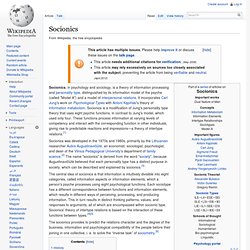
It incorporates Carl Jung's work on Psychological Types with Antoni Kępiński's theory of information metabolism. Socionics is a modification of Jung's personality type theory that uses eight psychic functions, in contrast to Jung's model, which used only four. These functions process information at varying levels of competency and interact with the corresponding function in other individuals, giving rise to predictable reactions and impressions—a theory of intertype relations.[1] The central idea of socionics is that information is intuitively divisible into eight categories, called information aspects or information elements, which a person's psyche processes using eight psychological functions. History[edit] Organizations[edit] There are several socionics organizations. ₪₪₪ Socionics - The New Psychology ₪₪₪ Wikisocion. Analyse transactionnelle.
Cet article présente des problèmes multiples.
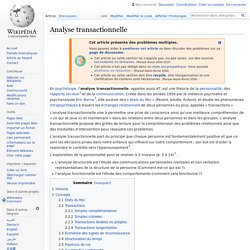
En psychologie, l'analyse transactionnelle, appelée aussi AT, est une théorie de la personnalité, des rapports sociaux[1] et de la communication. Créée dans les années 1950 par le médecin psychiatre et psychanalyste Éric Berne[2], elle postule des « états du Moi » (Parent, Adulte, Enfant), et étudie les phénomènes intrapsychiques à travers les échanges relationnels de deux personnes ou plus, appelés « transactions ». L'analyse transactionnelle vise à permettre une prise de conscience ainsi qu'une meilleure compréhension de « ce qui se joue ici et maintenant » dans les relations entre deux personnes et dans les groupes. L'analyse transactionnelle propose des grilles de lecture pour la compréhension des problèmes relationnels ainsi que des modalités d'intervention pour résoudre ces problèmes.
L'exploration de la personnalité peut se réaliser à 2 niveaux (p. 5 à 14)[3] : Histoire[modifier | modifier le code] Concepts[modifier | modifier le code] The Thirty-Six Dramatic Situations. The Thirty-Six Dramatic Situations is a descriptive list which was created by Georges Polti to categorize every dramatic situation that might occur in a story or performance.
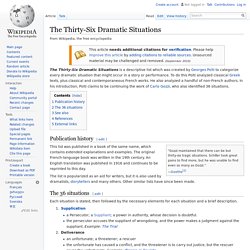
To do this Polti analyzed classical Greek texts, plus classical and contemporaneous French works. He also analyzed a handful of non-French authors. In his introduction, Polti claims to be continuing the work of Carlo Gozzi, who also identified 36 situations. Publication history[edit] “Gozzi maintained that there can be but thirty-six tragic situations. This list was published in a book of the same name, which contains extended explanations and examples. The list is popularized as an aid for writers, but it is also used by dramatists, storytellers and many others. The 36 situations[edit] Each situation is stated, then followed by the necessary elements for each situation and a brief description.
The Benjamin Franklin Effect. The Misconception: You do nice things for the people you like and bad things to the people you hate.
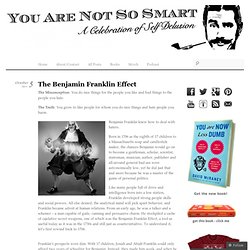
The Truth: You grow to like people for whom you do nice things and hate people you harm. Benjamin Franklin knew how to deal with haters. Born in 1706 as the eighth of 17 children to a Massachusetts soap and candlestick maker, the chances Benjamin would go on to become a gentleman, scholar, scientist, statesman, musician, author, publisher and all-around general bad-ass were astronomically low, yet he did just that and more because he was a master of the game of personal politics. Like many people full of drive and intelligence born into a low station, Franklin developed strong people skills and social powers. All else denied, the analytical mind will pick apart behavior, and Franklin became adroit at human relations. Franklin’s prospects were dim. At 17, Franklin left Boston and started his own printing business In Philadelphia. What exactly happened here?
Let’s start with your attitudes. Being Defensive. Comportement humain. Etude de: agression, sexualite, emotions, cognition, besoins et psychobiologie. Amy Cuddy: Your body language shapes who you are. Brené Brown: The power of vulnerability. The Phobia List. Is homophobia associated with homosexual ar... [J Abnorm Psychol. 1996. Early relationships, not brainpower, key to adult happiness. Public release date: 2-Aug-2012 [ Print | E-mail Share ] [ Close Window ] Contact: Joan Robinsonjoan.robinson@springer.com 49-622-148-78130Springer Positive social relationships in childhood and adolescence are key to adult well-being, according to Associate Professor Craig Olsson from Deakin University and the Murdoch Children's Research Institute in Australia, and his colleagues.
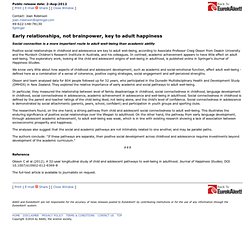
In contrast, academic achievement appears to have little effect on adult well-being. The exploratory work, looking at the child and adolescent origins of well-being in adulthood, is published online in Springer's Journal of Happiness Studies.